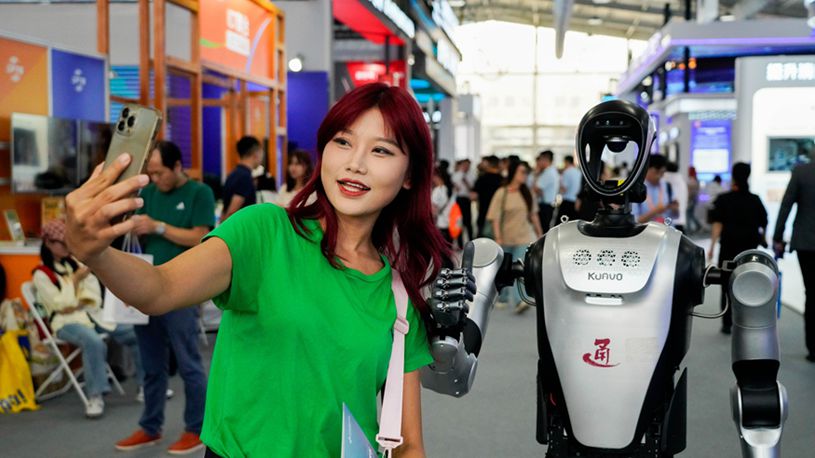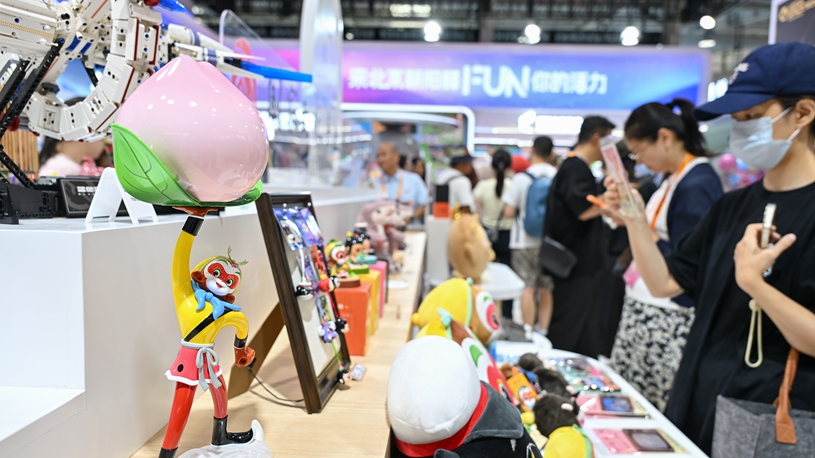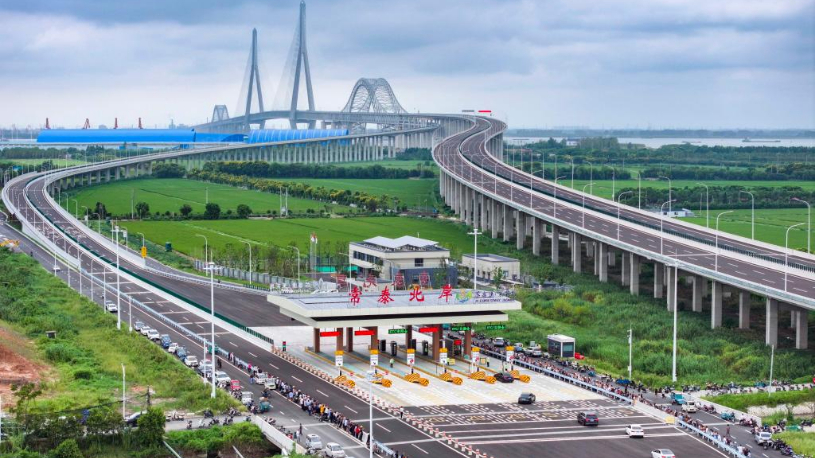Feature: AI enlightens Chinese burgeoning light salad industry
Source: Xinhua
Editor: huaxia
2025-09-12 23:06:17
by Xinhua writers Hu Tao, Wang Ruochen
BEIJING, Sept. 12 (Xinhua) -- Amid a booming wellness-oriented weight management trend in China, young entrepreneur Jiang Fangjun is busy on his unique track. He's training AI to serve health enthusiasts with fresh and high-quality light salads.
With a master's degree in computer science, Jiang tapped into the light salad sector by integrating AI technology into the production line. After years of exploration, he has cultivated an AI-featured light salad industrial chain and is gearing up to expand it into the catering field.
"The popularity of healthy food is a symbol of social progress. We have identified the new business track of producing light salad, independently developed AI-specialized equipment, and created many new job opportunities in this new industrial chain," said Jiang, CEO of the Jiangsu First Farm Technology Co., Ltd., which is headquartered in Changzhou City, east China's Jiangsu Province.
Jiang's entrepreneurial experience highlights how the Chinese young generation is making conventional agricultural products adaptable to modern dietary trends by utilizing and training AI to serve emerging application scenarios better.
TRAINING AI TO SELECT "STANDARD LEAVES"
The light meal, featuring a wide variety of vegetables, especially leafy vegetables, is a healthy dietary trend that echoes the demands of massive slimmers and health enthusiasts in China and globally.
There are no two identical leaves in the world. However, Jiang was ambitious to realize the industrial production of vegetable-based light salads by tackling the key challenge of "selecting standard leaves."
Having studied in Germany, Jiang was exposed to innovative practices in intelligent agriculture and the food industry, which sparked his idea of "producing salads like manufacturing precise instruments."
Jiang decided to develop a type of AI-specialized production equipment for light salads. He collaborated with Jiangsu University to customize the fully automatic production lines. But, over two years after these production lines were developed, they were not put into production, but "remained under training," Jiang disclosed.
Every day, the seemingly repetitive but important training was carried out for vegetables. Romaine lettuce, arugula, cherry tomatoes, carrots, and other fresh vegetables were continuously staged on the production lines.
Their mission was not to enter the packaging box, but to act as "models" to "train" the production lines -- high-speed high-definition cameras take pictures of these vegetables, and then feed the data to AI devices.
Then, the staff selected the "standard photos" of vegetables that looked good, fresh and healthy from all photos recording various heights, weights, and skin colors of the massive raw vegetables.
"In this process, we utilized AI technologies to form a set of stable and scientific sorting 'aesthetic' standards for the vegetable ingredients for light salads," Jiang said.
For standardized vegetable salads in mass production, foreign objects such as sediment, insects, rotten leaves, and grass roots are a "big headache." Conventional manual sorting makes it easy for workers to become fatigued and difficult to avoid defective products.
After sufficient data accumulation and training, the AI-specialized equipment can accurately identify and remove the flawed ones from the production line by utilizing massive "standard photos" and "foreign object photos" in its database.
By now, the picking accuracy rate of this smart AI equipment has reached 99.99 percent, with the picking amount of raw materials exceeding one tonne per hour. Meanwhile, its utilization rate of raw vegetables is 10 percent higher than that of manual sorting, according to Jiang.
BETTER CULTIVATING AI FOR PEOPLE
Following years of exploration, Jiang and his team have accumulated specialized data assets for creating "standardized" light salads, including various forms of vegetables and foreign ingredients.
"They are the widest 'moat' to safeguard the foothold of our company in the sector," Jiang said.
Jiang's exploration is not only pioneering in applying AI technology to light salad production in China, but also promoting the industry's transformation from a manual labor-intensive to a machine intelligence-based one.
"It is a very bold attempt to use AI to sort leaf vegetables in this industry," said Zhao Jianguo, manager of the Shanghai-based light salad plant of Jiangsu First Farm Technology Co., Ltd., which applies the AI-specialized production lines.
In the field of food processing, the world's earliest intelligent sorting equipment was used to screen grain. Among those tender leaf vegetables, they have irregular shapes and different sizes, making them even more challenging to identify and sort than fruits.
"Thanks to the tech advancement and the AI-specialized equipment, we have blazed this path," Zhao added.
In the plant, raw vegetable materials undergo three rounds of sorting and then receive disinfection and cleaning four times, with each procedure lasting at least 60 seconds. The washing water should be pure ice water at a temperature below 5 degrees Celsius, and the operating environment should be kept sterile.
Every light salad that comes off the production line must undergo inspection for both raw materials and quality. "The inspection work and report are ultimately done by people," Jiang said.
"In our production lines and industrial chain, it is people who make the final decision. What AI brings are higher work efficiency and lower cost consumption, as well as new job opportunities constantly created as the industrial chain expands," Jiang said.
By now, Jiang's company has built two modern plants and established 10 major alliance planting bases across the country, with a total planting area exceeding 30,000 mu (about 2,000 hectares) and an annual light salad output of 15,000 tonnes.
He is now preparing to open a robot-run restaurant specializing in health food in Changzhou City. It will mainly serve salad and other light meals by robot waiters, similar to Elon Musk's Tesla Diner, according to Jiang.
Even the vast blue ocean is ahead. "There is still a long way to go for AI to make the entire production line work as seamlessly as a human body, with hands, legs, eyes, and brain all coordinating in sync. AI-empowered production has more room for imagination," Jiang said. ■












Comments